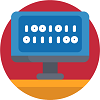Data has become the lifeblood of modern corporations. Organizations are no longer dealing with neat, centralized data repositories but rather fragmented, diverse, and constantly evolving data ecosystems. Controlling data against unauthorized access, modification, and redistribution is paramount.
The best way to control data and secure an organization is with a zero-trust security model, which assumes breaches are inevitable and requires continuous verification, least-privileged access, and real-time monitoring to protect data against dynamic threats. The zero-trust model emphasizes granular access control, where data is secured at a detailed level. It uses attribute-based access control (ABAC) to grant permissions based on user identity, device status, and access context. Techniques such as micro-segmentation, continuous monitoring, and data tagging isolate workloads, detect anomalies, and enforce policies, ensuring data is controlled and accessible only under authorized conditions.
At SineWave, we’re committed to zero-trust principles and proper data control. We’ve invested in several companies that adhere to this philosophy and continue to look for novel techniques and technologies that enable it. We’re excited about two emerging initiatives: data control planes and mesh architectures.
Data Control Planes
Data control planes help secure data by centralizing security policies, automating enforcement, and providing real-time monitoring across various data environments like on-premises systems, cloud platforms, and data lakes. They ensure consistent application of security protocols and provide dynamic, context-driven access control.
Centralized Policy Management: Data control planes provide a single control point for defining and managing data security policies, simplifying administration, and ensuring consistency across the organization.
Automated Enforcement: Data control planes automate the enforcement of data security policies, reducing manual effort and the potential for human error. Policies can be dynamically applied based on contextual information, ensuring access is granted only when appropriate.
Real-Time Monitoring and Auditing: Data control planes offer real-time visibility into data access and usage patterns. They generate alerts for suspicious activity, enabling security teams to respond quickly to potential threats. Detailed audit logs help organizations meet compliance requirements and demonstrate adherence to data security policies.
Data Mesh Architecture
On the other hand, a data mesh architecture promotes decentralization and ownership by empowering business domains to manage and control their data. Each domain sets its governance policies and access controls, ensuring secure, responsible data handling.
Decentralized Data Ownership: Data mesh empowers domain experts to manage and secure their data, fostering a sense of ownership and accountability.
Domain-Specific Data Governance: Each domain defines its data governance policies and access controls based on its specific requirements and risks.
Data as a Product: Data mesh encourages treating data as a product, clearly defining data quality, ownership, and access controls. This ensures that data is consistently managed and secured across the organization.
Data control planes and mesh architectures are transformative frameworks that align with zero-trust security principles to manage and secure data in today’s complex environments. Data control planes centralize security policies, automate enforcement, and provide real-time monitoring across diverse infrastructures, ensuring consistent compliance and threat detection. Meanwhile, data mesh decentralizes governance, empowering domains to manage data with tailored policies and access controls, fostering accountability and data quality. Both approaches emphasize least-privilege access, continuous verification, and dynamic security, making them essential for proper data control and securing fragmented and evolving ecosystems.
Adopting zero-trust principles is crucial as organizations face the growing challenge of securing dynamic data ecosystems. We’re excited to collaborate with and invest in startups prioritizing these principles and innovative data control solutions. If you’re focused on data control and zero trust, are building data control planes or mesh architecture technologies, reach out, and let’s talk!





















